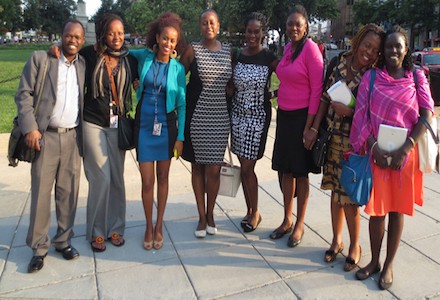Deadline: January 13, 2017
Applications are now open for the 2017 Leadership and Advocacy for Women in Africa (LAWA) Fellowship Program at Georgetown University Law Center. LAWA was founded in 1993 at the Georgetown University Law Center in Washington, DC, in order to train women’s human rights lawyers from Africa who are committed to returning home to their countries to advance the status of women and girls throughout their careers.
The entire LAWA Fellowship Program is approximately 14 months long – from July of the first year through late August of the following year. LAWA Fellows commit to returning home to continue advocating for women’s rights in their own countries. The LAWA Program starts in July, when the Fellows attend the Georgetown Law Center’s Foundations of American Law course. From August through May, the LAWA Fellows earn a Master of Laws (LL.M.) degree at Georgetown with an emphasis on international women’s human rights and complete a major graduate paper on a women’s rights issue. Fellows also participate in professional development seminars and networking events with recent U.S. law school graduates who are working in the field of women’s rights.
Eligibility Requirements
- You must be a women’s human rights lawyer from Africa in order to be considered. You must hold an LL.B. or other law degree. Preference is given to those who:
- are currently living and working in Africa, and
- do not already have a Masters’ Degree.
- Candidates who are awarded a LAWA Fellowship must be prepared to cover the costs of all additional expenses (such as visas, travel, housing, utilities, food, clothing, health insurance, books, fees, etc.). Candidates must be able to demonstrate to the U.S. Embassy for visa purposes that they have the full amount of funds available to cover these expenses at the time of their visa application. This totals over U.S. $25,845. For the summer internship portion, students need to show $2,232 per month, for the 2 to 3 month internship period. These costs are significantly less if you can affirm that you are staying with family in the Washington, DC area. Candidates are encouraged to apply for individual funding, or seek support from their employers. The LAWA Program does not have the capacity to assist with these efforts. Please refer to this for a sample budget from the last school year https://www.law.georgetown.edu/admissions-financial-aid/office-of-financial-aid/resources/upload/Budget-15-16.pdf.
- The strongest applicants tend to be about five to ten years out of law school. Others with less of more experience may be considered and accepted into the LAWA Program. Candidates with no work experience and are applying directly from an LL.B. or other law school will not be considered.
- Men who are committed to women’s rights are strongly encouraged to apply.
- As a requirement of participation in the LAWA Program, all applicants must commit to return home to their own countries upon completion of the Fellowship, and to use their best professional efforts to advance women’s human rights in their counties throughout their careers.
- You must have strong English language skills, both written and oral. Language problems have been the primary barrier to success for LAWA Fellows.
- The LAWA Program requires candidates to become proficient in using computers for drafting papers and conducting research. Candidates are strongly encouraged to learn basic computer skills before arrival in order to make this transition easier. At the very minimum, candidates should work to improve their typing speed before starting the program.
- Candidates must be prepared to enter a very demanding course of study. LAWA Fellows take four required courses and several more elective courses over the course of the two semesters. Fellows are required to produce a Masters’ Thesis totaling no fewer than 40 pages, including several drafts with intense research, writing and editing. Successful completion of of the program requires intense commitment, focus, and very hard work.
How to Apply
- Complete the Application Form, including all three essay questions.
- Current Resume or CV, indicating:
- your employment history, including both paid and volunteer positions, including the name of your employer, location of your employment (city, country), dates of your employment (start and end dates), and description of your work for each position you have held;
- your education from high school to the present, including the name and location (city, country) of the institution, dates attended (including date of graduation), degree awarded, grade point average or your class rank and number of students, and your participation in any extracurricular activities;
- titles of any published materials (articles, books, reports, etc.) or significant research papers;
- any special honors, awards, scholarships, or fellowships; and
- any memberships in organizations or community activities in which you have been involved, including any leadership roles.
- Two Letters of Recommendation (letters of reference) from persons who are well acquainted with you, your commitment to advancing women’s human rights in your country, your legal abilities, and your work.
- Official Law School Transcript
Send your completed application via e-mail to [email protected] by Friday, January 13, 2017. Letters of recommendation may be scanned and sent as e-mail attachments (preferred), or may be mailed separately. Please use only one method – do not send multiple copies. If you applied last year, you do not need to re-send your transcript, but you must resubmit your completed application form with your responses to questions 1-20, your updated resume, and updated recommendations.
Jill Morrison
Georgetown University Law Center
600 New Jersey Ave, NW, Room 5024A
Washington, DC 20001
E-mail: [email protected]
How to Apply
The application for the 2017-2018 Fellowship Year is available here.
You must check your email regularly beginning January 22nd, 2017, to see if you have been selected for an interview!
For more information, visit LAWA 2017

